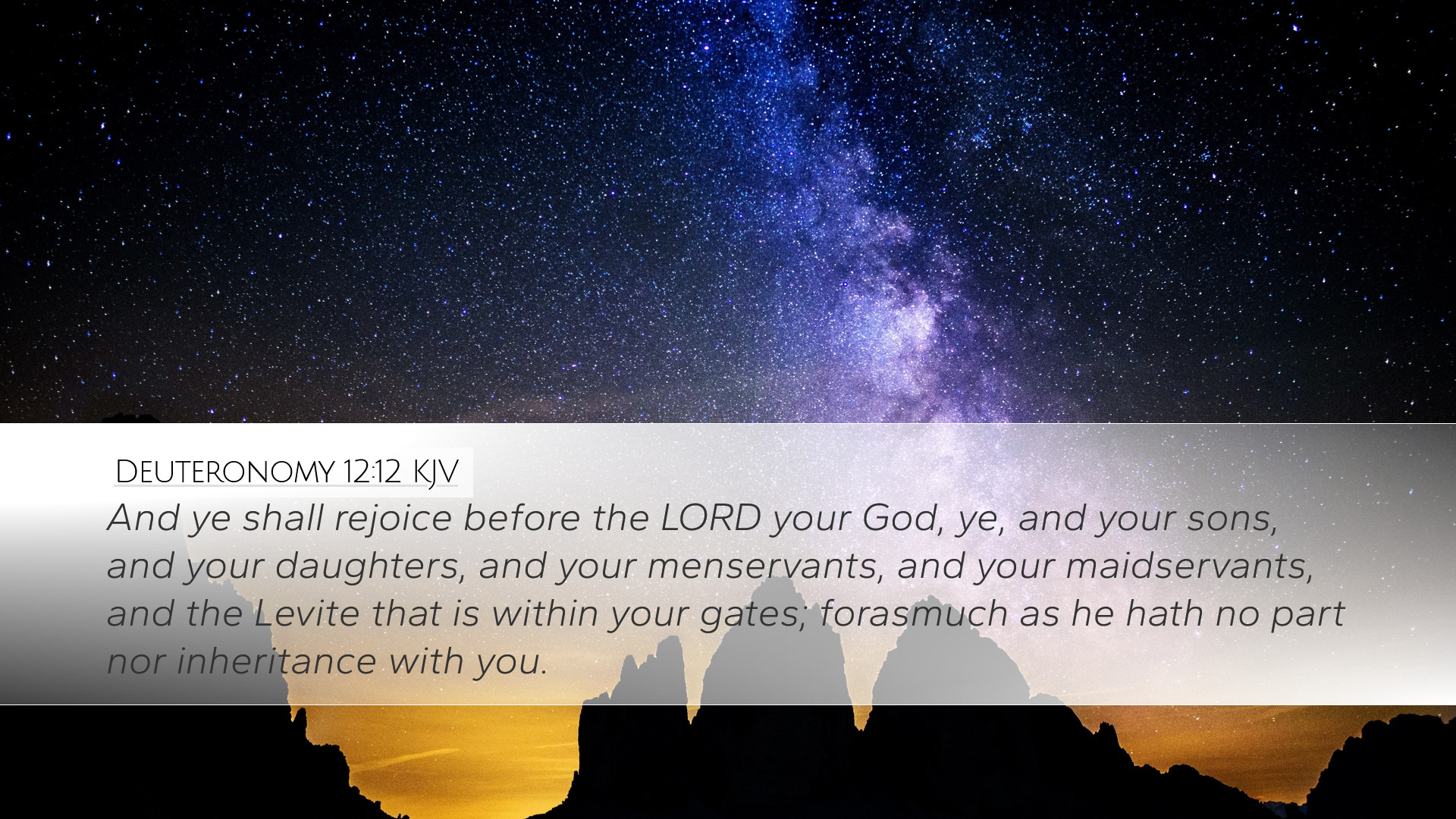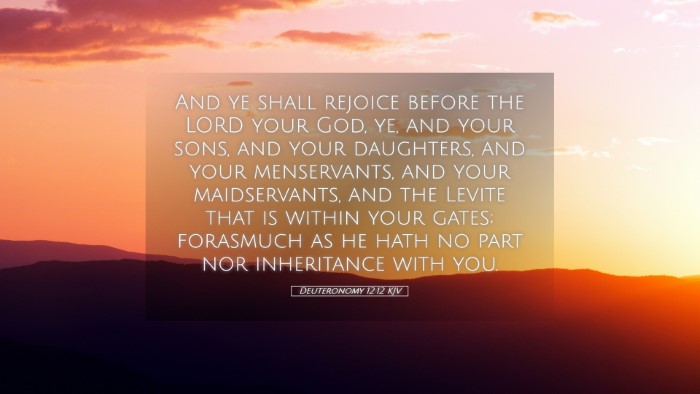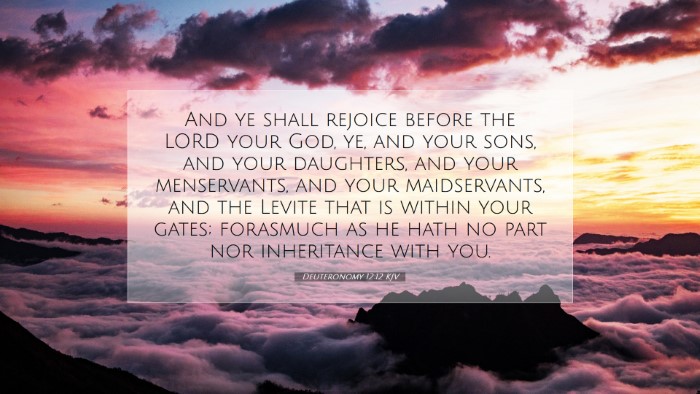Commentary on Deuteronomy 12:12
Bible Verse: “And you shall rejoice before the Lord your God, you and your sons and your daughters, your male servants and your female servants, and the Levite that is within your towns, since he has no portion or inheritance with you.” – Deuteronomy 12:12 (ESV)
Introduction
The verse Deuteronomy 12:12 serves as a call to communal joy and worship centered around the Lord God. In this passage, the Lord outlines the responsibilities of the Israelites concerning the central place of worship, emphasizing inclusivity and the joy that should accompany their covenantal relationship with Him. As pastors, students, theologians, and scholars delve into this text, the insights from reputable public domain commentaries enhance our understanding of its theological and practical implications.
Contextual Background
This verse is located within Moses' instructions to the Israelites as they prepare to enter the Promised Land. The previous chapters emphasize the importance of proper worship, the destruction of Canaanite high places, and the establishment of a central sanctuary. Notably, Deuteronomy 12:12 underscores the communal nature of worship, illustrating how each member of society, regardless of status, is called to participate in rejoicing before the Lord.
Thematic Insights
1. The Call to Rejoicing
Matthew Henry comments that the imperative to rejoice is not merely an emotional state but a deliberate act of worship that reflects a grateful heart towards God. The call to rejoice is both personal and communal, emphasizing the joy found in God’s presence, which should resonate in the hearts of His people.
2. The Inclusion of All Members
Albert Barnes notes the inclusivity portrayed in this verse. The mention of “you and your sons and your daughters, your male servants and your female servants” signifies that every individual in the community, regardless of social standing, is invited to worship and share in the joy of the Lord. This highlights the equal value of each person in God’s eyes and sets a precedent for future Christian communities, urging them to include everyone in the worship experience.
3. The Role of the Levites
Adam Clarke elaborates on the Levites' unique position within the Israelite community. As they lacked a territorial inheritance like the other tribes, they depended on the faithfulness of the people to provide for their needs. Therefore, their participation in communal rejoicing is vital, as they are both recipients of and contributors to the worship experience. This brings a deeper understanding of how worship should not only uplift individual families but also nurture those who serve God in dedicated roles.
Theological Reflections
1. Worship as a Community Activity
Deuteronomy 12:12 teaches that worship is intended to be a communal act. It fosters unity among believers, inviting all to express joy and gratitude to God together. This concept echoes the New Testament principles of fellowship and community found in Acts 2:46, where believers broke bread together with glad and sincere hearts.
2. The Nature of God’s Provision
Recognizing the Levites' roles underscores the idea that God provides for His people through each other. The duty to celebrate together reflects God's character as both a nurturer and a provider, calling believers to care for the leaders and ministers in their communities. This reinforces the responsibility of the faithful to support their pastors and church workers.
3. The Joy of the Lord
The command to rejoice signifies the joy that comes from a right relationship with God — a theme echoed throughout Scripture. Nehemiah 8:10 states, "The joy of the Lord is your strength," suggesting that this shared rejoicing is not only an expression of thanks but also an empowering act that deepens faith and community bonds.
Application for Today’s Church
In light of Deuteronomy 12:12, today’s church is encouraged to cultivate an environment where worship is inclusive and joyful. Pastors and church leaders are tasked with creating spaces where all community members feel valued and invited into the worship experience. Here are some practical applications:
- Create Inclusive Worship Services: Design worship experiences that cater to diverse groups within the congregation, ensuring that everyone feels welcome.
- Encourage Family Participation: Involve families in worship, helping them to connect with and support one another in faith.
- Recognize and Support Church Leaders: Acknowledge the service of church leaders and ensure they are spiritually and materially supported by the congregation.
- Celebrate God's Provision Together: Make space in worship for collective gratitude, sharing testimonies of God’s work in individual lives and in the community.
- Emphasize the Joy of the Lord: Encourage a culture of joy that permeates all church activities as a reflection of God’s presence and goodness.
Conclusion
Deuteronomy 12:12 encapsulates key elements of worship that remain relevant for today’s believers. The verses paint a picture of joyful, communal worship that honors God and includes everyone in the celebration of His goodness. As we explore this passage, may it inspire a deeper commitment to worship, community, and hospitality in our congregations, reflecting the heart of God in our midst.


